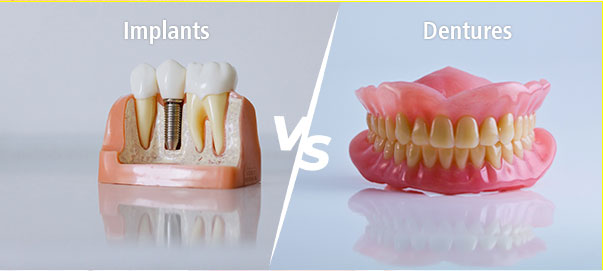Losing teeth can be a challenging experience, impacting not only your smile but also your ability to eat and speak comfortably. Fortunately, modern dentistry offers several options to replace missing teeth, with dental implants and dentures being the most common solutions. But how do you decide which is right for you?
This article will help you understand the differences, advantages, and disadvantages of dental implants and dentures. It will guide you through the decision-making process so you can choose the best option for your oral health, lifestyle, and budget.
Understanding Tooth Loss and Replacement Options
Tooth loss may result from injury, decay, gum disease, or aging. Restoring your teeth is essential for:
- Proper chewing and digestion
- Maintaining facial structure
- Preventing remaining teeth from shifting
- Enhancing self-confidence
Two main ways to replace missing teeth are dental implants and dentures. Both restore function and aesthetics but differ significantly in their approach.
What Are Dental Implants?
Dental implants are titanium posts surgically inserted into the jawbone, acting as artificial tooth roots. After integration with the bone (osseointegration), a crown, bridge, or denture is attached to the implant, restoring a natural-looking tooth or teeth.
Advantages of Dental Implants
- Durability and Longevity: Implants can last a lifetime with proper care.
- Bone Preservation: Stimulates the jawbone, preventing bone loss.
- Natural Appearance: Look and feel like real teeth.
- Comfort and Stability: Fixed in place, eliminating slipping or discomfort.
- Easy Maintenance: Brush and floss like natural teeth.
Disadvantages of Dental Implants
- Higher Initial Cost: More expensive upfront than dentures.
- Surgical Procedure Required: Involves minor surgery and healing time.
- Not Suitable for Everyone: Requires adequate bone density and good oral health.
What Are Dentures?
Dentures are removable prosthetic devices that replace missing teeth. They can be full dentures (replacing all teeth in the upper or lower jaw) or partial dentures (replacing some missing teeth).
Advantages of Dentures
- Lower Initial Cost: More affordable than implants initially.
- Non-Invasive: No surgery required.
- Quick Solution: Can be made and fitted relatively fast.
- Suitable for Many Patients: Even those with bone loss or medical conditions can often use dentures.
Disadvantages of Dentures
- Less Stable: Can slip or shift while talking or eating.
- Bone Loss Continues: Dentures do not stimulate the jawbone.
- Maintenance Required: Need daily cleaning and periodic adjustments.
- May Cause Discomfort: Potential for sores, irritation, or gag reflex.
- Shorter Lifespan: Usually need replacement or relining every 5 to 8 years.
Comparing Dental Implants and Dentures: Key Factors
To decide between dental implants and dentures, consider the following:
Functionality and Comfort
- Implants provide better chewing efficiency and comfort because they are securely anchored.
- Dentures may affect your ability to eat certain foods and can feel bulky or unstable.
Appearance and Confidence
- Implants closely mimic natural teeth, boosting self-esteem.
- Dentures can look natural but sometimes may feel less natural or cause speech difficulties.
Oral Health Impact
- Implants preserve bone and prevent teeth from shifting.
- Dentures do not prevent bone loss and may require adhesives to stay in place.
Cost and Time Commitment
- Implants have a higher upfront cost but may save money over time by avoiding replacements.
- Dentures are less expensive initially but may incur ongoing maintenance costs.
Suitability and Medical Considerations
- Implants need sufficient jawbone and good general health.
- Dentures can be an option when implants are contraindicated due to bone loss or health issues.
The Process: What to Expect
Dental Implant Procedure
- Consultation and Imaging: Evaluation of bone density and oral health.
- Implant Placement: Surgical insertion of the titanium post.
- Healing Period: Several months for osseointegration.
- Abutment and Crown Placement: Attachment of the prosthetic tooth.
Denture Fitting Process
- Initial Consultation: Oral examination and impressions.
- Temporary Dentures (optional): May be worn while permanent ones are made.
- Fitting and Adjustments: Ensuring comfort and proper bite.
- Regular Maintenance: Periodic checkups and relining as needed.
Who Should Choose Dental Implants?
- Patients with good overall health and healthy gums.
- Those with adequate jawbone density or willing to undergo bone grafting.
- Individuals seeking a permanent, natural-feeling solution.
- People who want to preserve their jawbone and facial structure.
Who Should Choose Dentures?
- Patients who cannot undergo surgery due to health issues.
- Those with significant bone loss making implants unfeasible.
- Individuals seeking a cost-effective and non-invasive option.
- Patients who want a quicker solution with less initial commitment.
Caring for Your Dental Implants and Dentures
Implant Care Tips
- Brush and floss regularly to avoid gum disease.
- Schedule dental checkups to monitor implant health.
- Avoid hard foods that may damage the crown.
Denture Care Tips
- Remove and clean dentures daily with a denture cleaner.
- Soak dentures overnight to keep them moist.
- Handle dentures carefully to avoid damage.
- Visit the dentist for regular adjustments.
Conclusion
Choosing between dental implants and dentures depends on your unique oral health, lifestyle, and budget. Dental implants offer a durable, natural, and comfortable solution but require surgery and higher upfront costs. Dentures provide an affordable, non-invasive option that is suitable for many patients but may come with compromises in comfort and maintenance.
Consulting with your dentist is essential to evaluate your oral health and discuss your goals. With professional guidance, you can find the right tooth replacement option that helps restore your smile and confidence for years to come.
FAQs
1. How long do dental implants last?
With proper care, dental implants can last 20 years or more, often a lifetime.
2. Can dentures be worn all day?
While dentures can be worn most of the day, it’s recommended to remove them at night to allow your gums to rest.
3. Is the dental implant procedure painful?
The procedure is done under local anesthesia, so you should not feel pain during surgery. Mild discomfort may occur during recovery.
4. Can I eat normally with dentures?
You can eat most foods, but very sticky or hard foods may be challenging and should be avoided.
5. Are there alternatives to implants and dentures?
Yes, options like dental bridges or implant-supported dentures exist depending on your dental condition.





